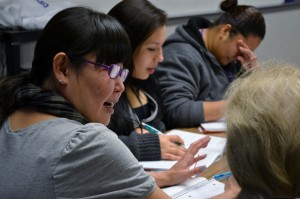
When Harue Machado moved from Japan to the United States 12 years ago, she enrolled in a junior college English as a Second Language (ESL) class, but had to drop out when she found a job. Now, the unemployed, 44-year-old single mother of two autistic children is picking up where she left off, with hopes of improving her English and navigating the ways of American life.
Josiellen Arindaeng is a 19-year-old San Jose resident whose parents were born in the Philippines. She dropped out of high school at 17 when she became pregnant with her first son. The single mother of two is back in school, pursuing a diploma so she can work as her mother’s research assistant in Sunnyvale.
Kamaldeep Kaur, also 19, moved with her family from India to the Bay Area in 2007. She still lives with her parents while balancing school with part-time work at a McDonalds, where she is paid $9 an hour as a manager. She wants to enter Evergreen Valley College’s nursing program, but is awaiting results of a lottery to see if there will be space for her next fall.
The three women are enrolled in San Jose’s Metropolitan Adult Education Program, often called MetroED. It provides roughly 2,000 Bay Area adults with the opportunity to improve their English, pick up a career technical diploma, or increase their math and reading comprehension skills. The program, run by the Metropolitan Education District under the San Jose Unified school system, also offers high school diplomas and GEDs.
At a time when public schools are breathing a sigh of relief after the passage of Proposition 30, which increased income taxes on wealthy Californians to fill a budgetary gap for K-12 and higher education, adult education remains in financial limbo.
MetroED has survived major funding reductions from the state and San Jose Unified over the past four years to continue providing its services, albeit to far fewer students (the program served more than 10,000 students in 2010-11) and with fewer class offerings.
But its existence is again in jeopardy. According to MetroED Superintendent Paul Hay, Gov. Jerry Brown wants to permanently establish the weighted student formula, which allocates state money to districts on a per-student basis depending on factors such as number of ESL learners and impoverished students. Currently, districts are allowed to use this money to fill whatever education needs they wish.
If the proposal to make the weighted student formula permanent is passed as part of the next state budget, programs such as MetroED could lose their funding for good. This would leave thousands of Californians — many of whom are from underprivileged populations — with little alternatives to better their lives through education, and would come at a time where job opportunities remain hard to come by.
It would also leave immigrants looking to learn English in a frustrating situation of wanting to better their lives but encountering barriers. Adult education is often the only option for those who are too old to attend high school and yet cannot qualify for – or afford – higher education.
“If the governor’s proposal goes through…adult education is dead in the state of California,” Hay said.
Elizabeth Ashford, a spokeswoman for the governor’s office, declined to comment on Brown’s current view of the weighted student formula ahead of the mid-January release of the budget. When Brown proposed making the weighted student formula permanent last year, the legislature said his proposal had to go through its policy committee. “Governor Brown was pursuing policies to make sure our budget was balanced,” Ashford said. “Now that Proposition 30 has passed, we’ll look closely at the budget for the coming year.”
San Jose’s MetroED is not alone in its budget woes. Twenty-two of the state’s 30 largest school districts have made significant cuts to adult education, according to a recent report published by the education nonprofit EdSource. Forty adult schools have closed across the state.
The first round of cuts hit MetroED in consecutive years (2008-09 and 2009-10) when the state eliminated 20 percent of its funding. In February 2009, the state passed legislation that allowed districts to “flex” funds from certain programs. San Jose Unified did so in January 2011, taking two-thirds of MetroED’s budget to support K-12 education, and will continue to do so until July 2015 – unless Brown’s legislation passes, which would eliminate this deadline.
San Jose Unified’s decision to flex funds from MetroED forced 5,000 of the then-7,000 adult education students out of their programs. In addition, more than 100 employees were laid off, and classes were consolidated onto the Hillsdale campus, whereas MetroED previously offered their programs at two other San Jose locations.
“You’re serving 10,000 students each year, and the state takes your money…and all of a sudden you’re only able to serve 2,000 students — that’s where the impact has been,” Hay said. “We’re not able to meet [demand], and that’s a fact.”
By law, any class that leads to a high school diploma must be free, such as the adult basic skills and GED preparation programs. ESL was part of that category until this year, when MetroED began charging $30 per semester for this class as now made allowable by the state. Career technical classes cost varying amounts depending on the program. For example, medical assisting — the class Kamaldeep Kaur is enrolled in — costs $1,250, plus a $250 materials fee, for the entirety of the program.
Of those students that MetroED is able to serve, many are from CalWORKs, a state-run welfare program for families and single parents. Others come from troubled home environments.
“Most of these students are coming from a background of not having stable families, enough money…they come from really challenged environments. Some of them were in jail, never had a job, nothing,” said Nazila Safari, Kaur’s medical assisting instructor.
Safari’s love of teaching is evident from her Hillsdale classroom decor. On a back wall hangs a set of pink nurse’s scrubs, signed by outgoing students. One message, written by a student named Dina, reads, “Dr. Safari: I want to thank you for the laughter and tears during my journey of reinvention. I will always appreciate our ‘talks’…my mentor I learned so much from this MA [medical assisting] class.”
Safari said that because of the recent cuts to MetroED, medical supplies are more limited, her class has a 30-40 student waiting list and she feels her job security is “endangered” on a yearly basis. Still, she beamed like a proud mother when talking about the success her students have found upon graduating.
“I always follow their career… [job placement] is 90 to 95 percent, which is a lot,” Safari said.

On a recent day, Safari’s students bustled about during their monthly lab time, testing out various nursing techniques on each other. At one station, a male student practiced venipuncture, slowly plunging a syringe into a female student’s arm. At another, a female student hoped to draw blood through capillaries practice.
Kaur, Safari’s appointed teaching assistant, explained what her classmates were practicing at each station. When defining medical terms, she spoke in the patient and clear manner of a practiced professional.
Kaur credits Safari’s class not only with helping her develop the skills necessary to becoming a nurse, but also with changing her perspective on life. Kaur said she “wasn’t too active” until one day when Safari approached her in class.
“She came to me and was like, ‘Do you want to be one of those students who really wants to do something in their life?’” Kaur said. “Then she offered [to make me] her teacher’s assistant.”
Kaur recently got a new job as a library page after applying for work with several different businesses to no avail.
“I tried to get jobs at so many places. I was disappointed [but] my professor encouraged me so much… [she] gives us hope for the future,” Kaur said.
Another major component to MetroED’s slate of programs is the adult basic education class, which helps students improve their skills in reading comprehension, math and grammar. Students who enter this program are required to pass the Test of Adult Basic Education (or T.A.B.E. Test) in order to move on to the high school or GED program. Their reading levels range from “0 to 8th grade,” according to instructor Susie Berger.
“Organizational skills [and] being responsible for following the agenda helps them in life,” Berger said. “I hope they stick with it and then continue on — learning is lifelong.”
Arindaeng, who is enrolled in Berger’s class, said the positive study habits she has acquired in the adult education program have reinforced the importance of being independent. “I was relying on my ex before, and I realized that [you should] never rely on anyone; everybody has to finish school,” Arindaeng said.
MetroED administrators such as Hay fears for where students like Arindaeng would go if MetroED loses its funding.
“Ultimately it will start to affect the other parts of the budget like welfare and jails,” Hay said. “These people will be pushed to the point where they don’t have any other options.”
Meanwhile, Machado said she aspires to earn her GED and find a job. But she wants to take her time in earning her education and continue focusing on the well-being of her children.
“I don’t want to rush, I want to really focus on what I need,” she said. “I don’t know exactly which direction I want to go, but I believe this is the beginning.”
[youtube]3lW-y13mpTQ[/youtube]
